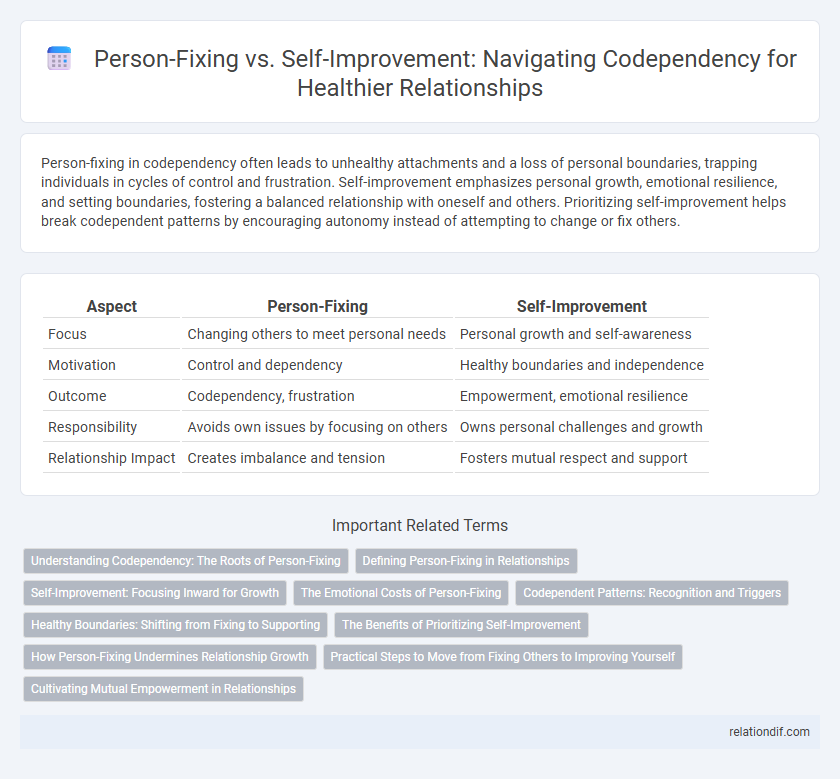Person-fixing in codependency often leads to unhealthy attachments and a loss of personal boundaries, trapping individuals in cycles of control and frustration. Self-improvement emphasizes personal growth, emotional resilience, and setting boundaries, fostering a balanced relationship with oneself and others. Prioritizing self-improvement helps break codependent patterns by encouraging autonomy instead of attempting to change or fix others.
Table of Comparison
| Aspect | Person-Fixing | Self-Improvement |
|---|---|---|
| Focus | Changing others to meet personal needs | Personal growth and self-awareness |
| Motivation | Control and dependency | Healthy boundaries and independence |
| Outcome | Codependency, frustration | Empowerment, emotional resilience |
| Responsibility | Avoids own issues by focusing on others | Owns personal challenges and growth |
| Relationship Impact | Creates imbalance and tension | Fosters mutual respect and support |
Understanding Codependency: The Roots of Person-Fixing
Person-fixing in codependency often stems from unresolved emotional needs and low self-esteem, driving individuals to control or "fix" others to feel valuable. This behavior contrasts with healthy self-improvement, which centers on personal growth, setting boundaries, and fostering independence. Understanding these roots helps distinguish codependent patterns from genuine self-development, promoting emotional well-being.
Defining Person-Fixing in Relationships
Person-fixing in relationships involves attempting to change or control another person's behavior, often driven by a need to feel needed or in control, which is a hallmark of codependency. This dynamic disrupts healthy boundaries and undermines mutual growth by prioritizing one partner's perceived flaws instead of fostering genuine self-awareness and personal development. Self-improvement, in contrast, centers on individual responsibility and growth without imposing expectations to alter the other person.
Self-Improvement: Focusing Inward for Growth
Self-improvement emphasizes personal growth by prioritizing self-awareness, emotional regulation, and resilience instead of attempting to fix others' problems. Developing healthy boundaries and fostering independence lead to sustainable changes, promoting well-being and reducing codependency patterns. Cultivating inner strengths transforms relationships by encouraging mutual respect and authentic connections.
The Emotional Costs of Person-Fixing
Person-fixing in codependency often leads to emotional exhaustion, as individuals invest excessive energy trying to change others rather than focusing on their own growth. This dynamic fosters resentment and stifles personal boundaries, eroding self-esteem and emotional well-being. Prioritizing self-improvement nurtures autonomy and healthier relationships by emphasizing self-awareness and emotional resilience instead of controlling others.
Codependent Patterns: Recognition and Triggers
Codependent patterns often involve person-fixing behaviors, where individuals attempt to control or change others to feel secure. Recognizing triggers such as low self-esteem, fear of abandonment, and excessive caretaking is essential for shifting focus from controlling others to fostering self-improvement. Developing self-awareness and setting healthy boundaries reduces codependent dynamics and promotes emotional independence.
Healthy Boundaries: Shifting from Fixing to Supporting
Person-fixing in codependency involves trying to change others to meet one's own needs, often leading to blurred boundaries and emotional exhaustion. Emphasizing self-improvement sets healthy boundaries by prioritizing personal growth and emotional autonomy without overstepping others' independence. Shifting from fixing to supporting fosters mutual respect, encouraging empowerment rather than control in relationships.
The Benefits of Prioritizing Self-Improvement
Prioritizing self-improvement in the context of codependency fosters emotional resilience, personal growth, and healthier relationships by shifting the focus from trying to fix others to enhancing one's own well-being. This approach cultivates autonomy, boosts self-esteem, and reduces reliance on external validation, leading to a more balanced and fulfilling life. Emphasizing self-awareness and personal development helps break the cycle of codependent behaviors and promotes sustainable mental health.
How Person-Fixing Undermines Relationship Growth
Person-fixing in codependent relationships creates imbalanced dynamics by prioritizing control over genuine connection, which stifles personal growth for both individuals. This behavior leads to resentment and emotional exhaustion as the fixer assumes responsibility for the other's problems, preventing healthy boundaries and mutual support. Self-improvement fosters autonomy and trust, encouraging each person to develop independently while strengthening the relationship through shared growth and accountability.
Practical Steps to Move from Fixing Others to Improving Yourself
Shifting focus from person-fixing to self-improvement begins with setting clear personal boundaries and recognizing control limits in relationships. Practical steps include developing self-awareness through journaling or therapy, prioritizing emotional intelligence, and investing in skills that enhance personal growth like mindfulness or stress management. Emphasizing self-care routines boosts resilience, enabling healthier interactions without the compulsion to fix others.
Cultivating Mutual Empowerment in Relationships
Person-fixing in codependent relationships often leads to imbalance and resentment, while self-improvement fosters personal growth and healthier boundaries. Cultivating mutual empowerment requires both partners to support each other's development without trying to control or "fix" one another. Emphasizing shared goals and open communication promotes resilience and emotional interdependence rather than dependency.
Person-fixing vs Self-improvement Infographic

 relationdif.com
relationdif.com